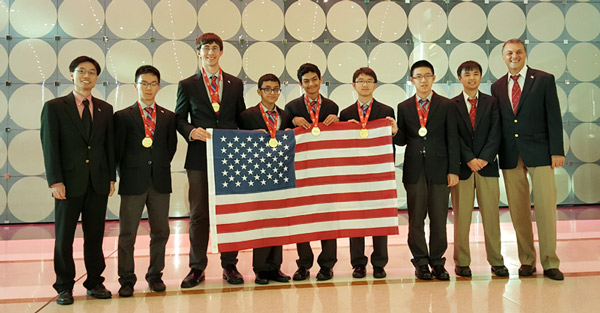‘Math Evangelist’ Po-Shen Loh Wants to Bring Higher-level Math Education to the Masses
When it comes to mathematics, Hertz Fellow and Carnegie Mellon University professor Po-Shen Loh isn’t just a superstar in his own right, he’s also a self-proclaimed “math evangelist” on a mission to share his message throughout the world.
In his role as head coach for the U.S. International Math Olympiad team, Loh has helped turned the Americans into a veritable powerhouse. After winning the Olympiad in 2015, a first for the U.S. in 21 years, in July Loh’s team duplicated the feat, this time having all six team members take home gold medals.
“It’s a huge deal,” Loh said of the back-to-back victories. “Last year was nice, but it wasn’t our goal; other countries weren’t sure if it was a fluke. When you do it again right away, that shows it wasn’t a fluke.”
For the uninitiated, the Olympiad isn’t just another math competition. The questions asked these high school-aged ‘mathletes’ during the two-day event are atypical–instead of coming up with numerical answers, students have to explain why the concepts work, requiring a deep analysis and understanding akin to the work of a PhD student. The approach to the Olympiad fits well with Loh’s philosophy about math not being about calculations, but as a higher order found everywhere in nature, and a discipline allowing people to discover novel routes to analyze and solve real-world problems.
“Math to me is the root of all thinking, and thinking is what makes us human,” Loh said. “With robots replacing humans in routine jobs, what is the role of the human going to be in the next 100 years? “It will be to do the non-routine tasks, to come up with the things that machines cannot. That’s what math is all about: coming up with new ways of thinking.”
Following the win at the Olympiad, Loh spent next week traveling throughout Malaysia and India, demonstrating how math can be used to solve seemingly impossible problems. In his talks, as one example, Loh displays a board with 64 squares in an 8×8 grid, like a chessboard, but where the squares are colored black and white with a random pattern. He studies the board for less than a minute, and then looks away while a student flips the color of exactly one square. Turning back, he identifies which square was flipped – all by doing about 400 calculations rapidly in his head. It isn’t memorization, Loh says, it’s math.
“It’s not a superhuman power,” said Loh. “It’s simple to do once you know how to do it. If you have math in your back pocket, you can use it as a tool to do things you didn’t think you could do.”
For years, the U.S. has lagged well behind other countries in mathematics, and is currently around the middle of the pack for developed nations. However, the tide appears to be turning, Loh explained; thanks to the emergence of online resources and a greater focus on STEM education, the number of top-level math students is soaring.
Loh’s goal is to multiply the number of people in the world who enjoy and excel at math by a factor of 10. To help reach it, Loh founded Expii (https://www.expii.com), a free online simulated tutor that provides an adaptive personalized education in mathematics. With Expii, Loh wants to help revolutionize global education, and even though it’s new on the scene, Expii is getting thousands of visitors per week. Loh expects participation to grow as more students look to the Internet to supplement their education outside of the classroom.
“Anyone can take advantage of online resources,” Loh said. “Anyone who wants to get better at mathematics can do that without regard to how much money they have, who their parents are or where they grow up. As the internet levels the playing field, there’s a lot of talent emerging from all corners.”
Loh calls Expii his “biggest project,” but as an educator himself, Loh doesn’t see computers fully replacing humans in the classroom. More than likely, he said, online education will supplement the teacher’s work in the classroom and help lead to better educated population.
“In the conventional school model, if you miss class or lose anything in the chain of prerequisite concepts, it’s hard to catch up,” Loh said. “But when you have a system personalized to you, it’s easier to learn, as it focuses on your missed dependencies rather than building further confusion by assuming you already understand them. There’s definitely a role for the human teacher, but if there are tools that will help them with their work, then everyone will benefit.”
